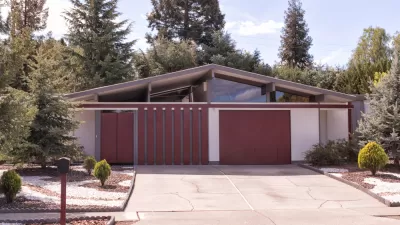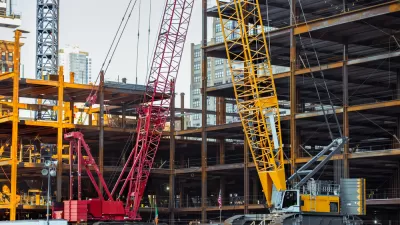City council members of Burlingame, a small, affluent suburb south of San Francisco, are not happy with new laws that take away their discretion to reject developments that fail to meet "neighborhood character" criteria, but meet zoning requirements.
At their meeting on Dec. 4, the "Burlingame City Council critiqued the most recent batch of laws signed by the governor designed to combat the state housing crisis," reports Austin Walsh for The (San Mateo County) Daily Journal on Dec. 7.
While acknowledging the intent of the policies designed to address affordability through loosened development regulations, councilmembers suggested the implementation may be inappropriate for Burlingame.
As one would expect, it was the streamlining, "by-right" housing bill, SB-35 by Sen. Scott Wiener (D-San Francisco) that irritated council members and one member of the public, "as the legislation strips the currently held rights of local administrative bodies to hold up construction of proposals meeting a certain, albeit narrow, criteria," writes Walsh.
The law pertaining to multi-residential developments with at least 10 percent of affordable units proposed in an appropriately zoned area on a site which has not served as tenant housing in the last decade would only be subject to objective review by planning commissions.
Such standards would greatly reduce the rights of commissioners to delay or deny certain proposals on the grounds of project designs being deemed incompatible with surrounding neighborhood character.
However, "preserving neighborhood character" can mask an anti-growth, anti-density, and even segregationist approach to zoning, as noted by Conor Dougherty, economics reporter at The New York Times, on July 3, 2016:
Studies have shown that laws aimed at things like “maintaining neighborhood character” or limiting how many unrelated people can live together in the same house contribute to racial segregation and deeper class disparities. They also exacerbate inequality by restricting the housing supply in places where demand is greatest.
And density was a key concern of council members, adds Walsh. "Beyond the architectural impact, SB 35 would also disallow local officials from denying a proposal due to concerns it would be too dense for its surrounding community."
SB 35 addresses those discretionary abilities used by city councils to reject housing in cities that fail to meet their housing requirements. The purpose of "by-right" housing is "to streamline local approval of residential projects that are compliant with local zoning and affordable housing requirements in urban areas," wrote Sonja Trauss and Kate Vershov Downing in this Mercury News commentary last year on the unsuccessful predecessor to Wiener's bill.
A key aspect of the law that the Burlingame City Council may not have recognized is that the streamlined housing approval process only applies to "cities that are not meeting their housing goals required by the Regional Housing Needs Assessment (RHNA)," according to Wiener's office. "This streamlining will expedite the construction of critically needed housing."
Council members also took issue with SB 166 by Sen. Nancy Skinner (D-Oakland)
Under Senate Bill 166, officials must justify the rationale for allowing developments diverting from the state’s consideration of each site’s highest and best use, which favors construction of dense and affordable housing.
According to Skinner's office, the law "strengthens the No Net Loss zoning law by requiring local governments to immediately identify a replacement site if a project that differs from the housing category originally designated is approved. Additionally, SB 166 requires that the replacement site must meet the specific housing affordability level that was lost."
FULL STORY: New housing laws roil officials in Burlingame

Planetizen Federal Action Tracker
A weekly monitor of how Trump’s orders and actions are impacting planners and planning in America.

San Francisco's School District Spent $105M To Build Affordable Housing for Teachers — And That's Just the Beginning
SFUSD joins a growing list of school districts using their land holdings to address housing affordability challenges faced by their own employees.

The Tiny, Adorable $7,000 Car Turning Japan Onto EVs
The single seat Mibot charges from a regular plug as quickly as an iPad, and is about half the price of an average EV.

As Trump Phases Out FEMA, Is It Time to Flee the Floodplains?
With less federal funding available for disaster relief efforts, the need to relocate at-risk communities is more urgent than ever.

With Protected Lanes, 460% More People Commute by Bike
For those needing more ammo, more data proving what we already knew is here.

In More Metros Than You’d Think, Suburbs are Now More Expensive Than the City
If you're moving to the burbs to save on square footage, data shows you should think again.
Urban Design for Planners 1: Software Tools
This six-course series explores essential urban design concepts using open source software and equips planners with the tools they need to participate fully in the urban design process.
Planning for Universal Design
Learn the tools for implementing Universal Design in planning regulations.
Smith Gee Studio
City of Charlotte
City of Camden Redevelopment Agency
City of Astoria
Transportation Research & Education Center (TREC) at Portland State University
US High Speed Rail Association
City of Camden Redevelopment Agency
Municipality of Princeton (NJ)





























